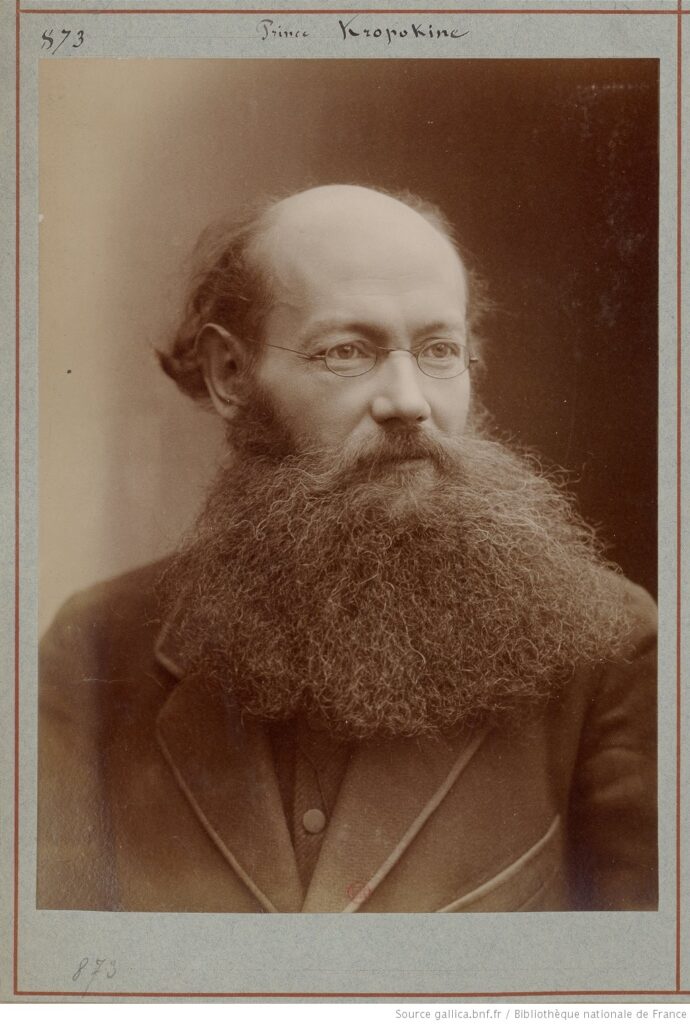Pyotr Kropotkin’s Mutual Aid

Credit: Atelier Nadar. Bibliothèque nationale de France, département Estampes et photographie, FT 4-NA-237 (3)
Licence: Public domain
1900
| Giver: | Individual |
|---|---|
| Receiver: | - |
| Gift: | Other |
| Approach: | Reciprocal Gift |
| Issues: | 10. Reduced Inequalities, 11. Sustainable Cities and Communities |
| Included in: | Industrial Revolutions, Mutual Aid |
Pyotr Alexeyevich Kropotkin (1842-1921) was a Russian anarchist and geographer. He remains best known for his 1902 essay collection “Mutual Aid: A Factor in Evolution,” a landmark treatise on human cooperation. Rooted in Kropotkin’s investigations into evolutionary biology, the work posits that the animal kingdom is driven not by a competitive law of “survival of the fittest” but by a process of collaboration that enables living creatures to help and protect each other under harsh environmental conditions. Convinced that the same principle applied to human beings, Kropotkin contended that society could be reorganized along non-hierarchical lines to better cultivate social cohesion, individual freedom and prosperity.
The son of a Russian prince, Kropotkin spent his early career in Siberia conducting geographical surveys for the Russian military. Following the death of his father he traveled to Switzerland, where he became active in socialist politics. Upon returning to St. Petersburg he joined the Tchaikovsky Circle, a literary society with radical political leanings. His affiliation with the group led to his incarceration as a dissident, though he eventually escaped from prison and fled to Western Europe.
During his years in exile Kropotkin developed the anarchist philosophy that became the basis of his writings. His ideas offered a scathing critique of capitalism, notably the concept of Social Darwinism espoused by British philosopher Herbert Spencer. Whereas Spencer believed that economic prosperity arose out of fierce battle over scarce resources, Kropotkin insisted that a modern industrial economy could be founded on an innate human capacity for generosity. In Kropotkin’s view, the natural human urge to cooperate was stifled by oppressive social forces that relied on competition and exploitation to generate wealth.
Kropotkin was also a passionate critic of Karl Marx, charging that the German philosopher’s ideal of a collectivist state was antithetical to mutual aid. In contrast to Marx’s totalitarian vision, Kropotkin imagined a society composed of small communities, such as communes and villages, where a spirit of teamwork and consensus could emerge organically out of personal relationships forged between citizens. In an era of sweeping political change, Kropotkin posited a theory of economic cooperation that harkened back to more traditional, localized models of social organization.
Kropotkin’s faith in human solidarity lies at the core of the anarchist tradition, while his writings offer a theoretical basis for mutual aid networks in the twenty-first century. For Kropotkin, these modes of organization were all the more viable for being rooted in human biology. “Neither the crushing powers of the centralized State nor the teachings of mutual hatred and pitiless struggle,” he avows in “Mutual Aid,” “could weed out the feeling of human solidarity, deeply lodged in men’s understanding and heart, because it has been nurtured by all our preceding evolution.”
Contributor: Matt Price
| Source type | Full citation | Link (DOI or URL) |
|---|---|---|
| Publication |
EDDY, BETH. 2010. “Struggle or Mutual Aid: Jane Addams, Petr Kropotkin, and the Progressive Encounter with Social Darwinism.” The Pluralist 5 (1): 21–43. ` |
https://doi.org/10.5406/pluralist.5.1.0021 |
| Publication |
Kinna, Ruth. 1995. “Kropotkin’s Theory of Mutual Aid in Historical Context*.” International Review of Social History 40 (2): 259–83. |
https://doi.org/10.1017/S0020859000113227. |
| Publication |
Kropotkin, Kropotkin Peter. 2021[1902]. Mutual Aid: A Factor of Evolution. Black Rose Books Ltd. |
- |
| Publication |
Barnard, Alan. “Mutual Aid and the Foraging Mode of Thought: Re-Reading Kropotkin on the Khoisan.” Social Evolution & History 3, no. 1 (2004): 3–21. |
https://cyberleninka.ru/article/n/mutual-aid-and-the-foraging-mode-of-thought-re-reading-kropotkin-on-the-khoisan. |